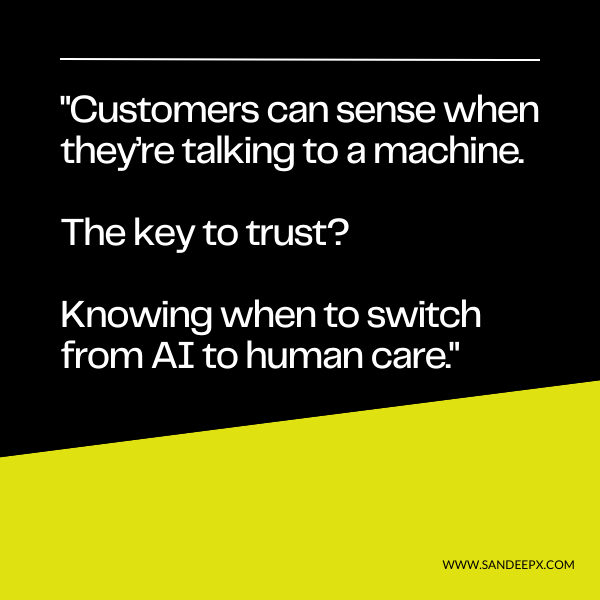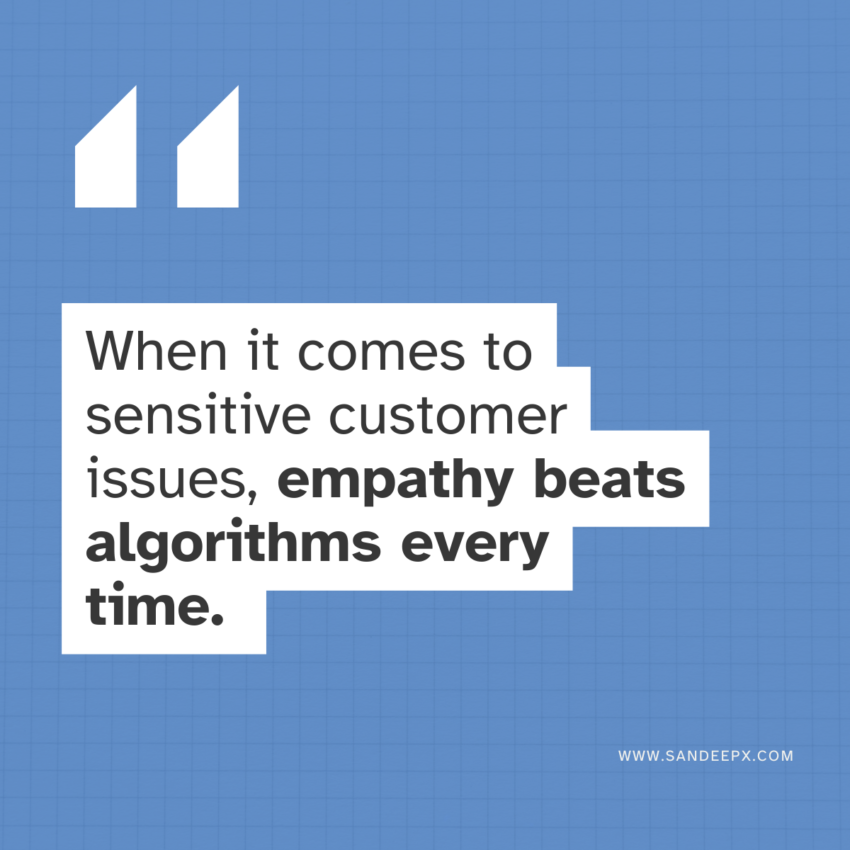Let’s be real: human relationships are complicated. We’re emotional, intuitive, and unpredictable, and when we need help—whether it’s with a brand we love or a problem that’s stressing us out—what we crave most is someone who “gets” us. But here’s the thing: when that “someone” turns out to be a chatbot, things can quickly take a wrong turn.
Picture this: you’re having a terrible day. You just received a broken item from your favorite online store, and you hop on their website for customer support.
A chatbot pops up—friendly, polite, and eager to help. It asks all the right questions, and within two or three interactions, you’re like, “Wait a minute… I’m talking to a machine, aren’t I?” Suddenly, that smooth, efficient exchange feels cold and mechanical.
What you need is empathy, but what you’re getting is scripted responses. That’s the moment you roll your eyes, close the chat, and maybe even reconsider your loyalty to the brand.
This is where the hype around AI chatbots in customer support starts to fall apart. Sure, AI-powered chatbots are great for quick, non-emotional tasks—like tracking your order, answering FAQs, or checking a refund status. But when it comes to more complex, emotionally charged issues, humans can spot the difference between a machine and a real person within seconds.

When the Chatbot Falls Short
Let’s dive deeper. Think about the last time you needed to deal with something important—maybe you had a billing issue with your credit card, or you needed to resolve a personal medical concern. The moment you realized the chatbot wasn’t cutting it, you probably groaned, mashed the “Speak to a human” button, and hoped for a real person on the other side. Why? Because in sensitive cases, we expect someone to understand not just what we’re saying, but how we feel.
And this is where brands can really lose out. If they rely too heavily on chatbots for these types of interactions, they risk alienating customers who need emotional intelligence, not artificial intelligence. No matter how advanced AI gets, it can’t handle the nuances of human emotion—at least, not in a way that leaves people feeling heard.
But Don’t Count AI Out Yet
Now, I’m not saying AI chatbots are worthless. Far from it! For those everyday, routine issues that customers want to be solved fast—like confirming an order or finding store hours—AI is a lifesaver. Chatbots can handle thousands of these inquiries at once, reducing wait times, offering 24/7 service, and saving companies a ton of money. In fact, a simple “Where’s my order?” is exactly the kind of question that AI chatbots were born to answer.
But the marketing hype around AI chatbots often makes them seem like miracle workers. The idea is that AI will soon replace human agents altogether. Spoiler alert: it won’t. At least, not if brands care about customer loyalty and long-term relationships. Customers aren’t just looking for quick answers; they’re looking for care, empathy, and understanding. And that’s something AI—no matter how clever—can’t always deliver.
The Chatbot Breakup: A Story
Let me tell you a quick story. A friend of mine recently switched banks. Why? Because she had a major issue with a fraudulent transaction, and after two hours of talking to a chatbot that kept sending her in circles, she finally gave up. She told me, “All I wanted was for someone to listen and assure me that they understood how stressful this was!” Instead, she got a bot. And the moment she realized it, she was done.
This kind of scenario plays out more often than we think. Chatbots might be good at processing data, but they don’t understand how freaked out someone is when their bank account is at risk. And when brands fail to recognize the limitations of AI, they lose more than just one customer—they lose trust, and trust is hard to rebuild.

source: eMarketer
So, What’s the Answer?
It’s simple: balance. AI chatbots are incredible tools for handling repetitive, straightforward stuff. Let them shine where they’re most effective. But for the love of customer service, don’t rely on them for everything! For more sensitive, high-stakes issues, you need real humans who can jump in, listen, and empathize.
The smartest brands are the ones that get this balance right. They use AI to enhance their customer service, not replace it. They train their chatbots to know when it’s time to pass the conversation on to a human. And when customers do need to talk to a person, that handoff should be seamless.
The Final Word on AI Hype
We’ve all heard the hype: AI is the future of customer service. But in reality, the future isn’t AI versus humans—it’s AI and humans, working together. So, before we put all our faith in chatbots to handle every customer interaction, let’s remember what really matters: human relationships. And when it comes to building those, a machine can only take us so far.
So, yes, AI is great—just don’t expect it to solve everything. When it comes to marketing and customer service, the heart of the matter still belongs to us humans.
